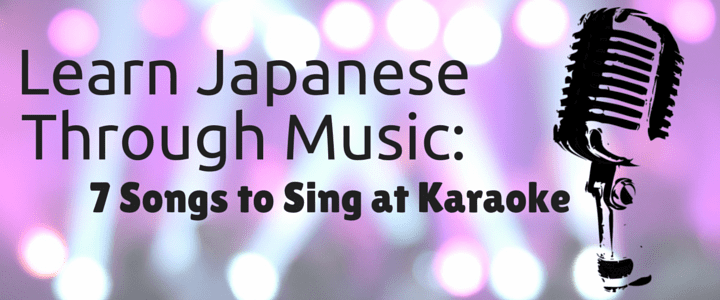

Sing-alongs (present since the beginning of singing) fundamentally changed with the introduction of new technology. The primary difference between Karaoke and sing-along songs is the absence of the lead vocalist.
#Popular japanese karaoke songs tv
If you’re someone who celebrates Christmas, or is familiar with the holiday jingle, this song is a great crossover since you already have the melody down.A karaoke bar in Wuhan, Hubei, China 1960s: Development of audio-visual-recording devices įrom 1961 to 1966, the American TV network NBC carried a karaoke-like series, Sing Along with Mitch, featuring host Mitch Miller and a chorus, which superimposed the lyrics to their songs near the bottom of the TV screen for home audience participation. “We Wish You a Merry Christmas” (おめでとうメリークリスマス)Īlright, We Wish You a Merry Christmas isn’t a Japanese song, but since Christmas isn’t a holiday restricted to one nation, it’s Japanese adaptation is certainly fair play. Maybe find a place that sells them and munch on one while you listen along.Ģ. Taiyaki’s are also delicious Japanese fish-shaped cakes. The song is written from a fish’s perspective, and details life as a fish in Japan (hint, it’s far from great). It was made by Masato Shimon, and the label he was on originally claimed it was a children’s song since it was used on the children’s television show, Hirake Ponkikki. Oyoge! Tayaki-kun is the bestselling Japanese song to-date. We’ve done our best to find some of the most popular, as well as easy to sing along to, Japanese songs for your enjoyment. The list of songs you’ll be able to practice and sing along with. Okay, it’s the moment you’ve been waiting for.


So, you’ll frequently hear slang, idioms and other parts of speech being used in different and unfamiliar ways, which will only help you learn more.ġ5 top Japanese songs that are surprisingly easy to sing along This is because songwriters often employ daily vernacular opposed to proper and formal ways of speaking. Whether you’re a beginner or someone who’s spoken Japanese for years, there will always be dozens of songs for you to listen to and learn from. The more Japanese songs you listen to, the more Japanese vocabulary you’ll know. Having the flexibility to study Japanese on-the-go gives you more control in your language-learning process, which is important. You can listen to songs on your morning commute, during workout sessions at the gym, or even right before you go to sleep. Instead of having to lug around a heavy textbook, listening to Japanese music is as easy as downloading some onto your cellphone and popping in your headphones. It’s also especially important in the case of the Japanese language, since Japan is the land of Karaoke (it was invented by Daisuke Inoue in 1971). Some musicians make a point of discussing politics, others focus on everyday life that may go unnoticed, and a handful look to the more exciting parts of a people’s past, present and future. One reason is because it’s so wide-ranging. Music is one of the best ways to engage with any culture. Below are a handful of reasons: Discover Japanese culture Why use Japanese songs to learn Japanese?īefore jumping into the songs, it’s important to understand why using top Japanese songs to learn Japanese is effective.


 0 kommentar(er)
0 kommentar(er)
